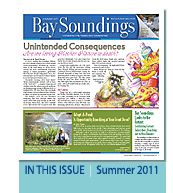 |
||||||||

2011 Legislative Update
If life was a baseball game and the Agency on Bay Management was the hometown team, the score from the 2011 Florida Legislature might look like five wins and three losses.
In the loss column:
AGRICULTURE EXEMPTIONS TO WATER MANAGEMENT REQUIREMENTS
This legislation essentially allows uncontrolled impacts to wetlands within lands that are or have been used for agriculture over the past seven years, retroactive to 1984. It will result in wetland destruction in preparation for conversion of agricultural operations to more intense development. It also creates conflict between the Department of Agriculture and Consumer Services and the water management districts that now oversee wetland management.
GROWTH MANAGEMENT
ABM opposed this legislation because it preempts many planning and management activities of local governments, including those which the community implements to meet the needs and desires of its citizens. The legislation reorganized several government agencies and changed the state's role in growth management and local plan reviews.
FUNDING FOR FLORIDA FOREVER
Gov. Scott vetoed funding for what is generally considered to be the nation's premier environmental lands purchasing program. The legislature had allowed expenditures of up to $308.6 million to be funded through the sale of surplus state-owned lands. Although the state had identified lands with a potential value of about $50 million, officials predicted that only about $6 million worth could actually be sold in the current economic climate.
The five wins include:
SEPTIC TANKS
ABM opposed this measure because it would have removed the requirement that septic tanks be inspected every five years to ensure that they are properly maintained to protect the environment and public health.
NUMERIC NUTRIENT QUALITY CRITERIA
ABM appreciated the intent of the legislation but opposed it for a number of technical reasons, specifically the concern that not implementing federal law might make it difficult for local governments to obtain necessary stormwater permits.
ENVIRONMENTAL PERMITTING
ABM opposed this legislation because it would reduce the time for agency processing of permit applications and increase the use of general permits for wetland projects as well as other technical problems that would make it easier for development to impact water quality and natural resources.
SURFACE WATER IMPROVEMENT & MANAGEMENT
ABM opposed this measure that would have prevented local governments from requiring that developers retrofit archaic drainage structures in redevelopment areas.
LOCAL FERTILIZER REGULATIONS
Although the legislature did pass a fertilizer bill that restricts local governments from preventing summer bans on fertilizer sales, it does include amendments that partially reflect ABM's position. Local ordinances passed before July 1, 2011 are grandfathered in, so both Manatee County and the City of Tampa passed new ordinances in advance of that deadline. It also allows for local governments to pass ordinances that may be stronger than the state's model ordinance in the future.
